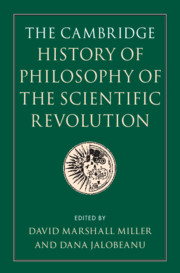Book contents
- The Cambridge History of Philosophy of the Scientific Revolution
- The Cambridge History of Philosophy of the Scientific Revolution
- Copyright page
- Contents
- Tables and Figures
- Contributors
- Preface
- Introduction The Disciplinary Revolutions of Early Modern Philosophy and Science
- Part I The Disciplines
- Part II Disciplinary Activities
- Part III Problems and Controversies
- 17 Galileo’s Sidereus Nuncius and Its Reception
- 18 Instruments and the Senses
- 19 Science of Mind
- 20 Circulation and the New Physiology
- 21 From Metaphysical Principles to Dynamical Laws
- 22 The Debate About Body and Extension
- 23 Space and Its Relationship to God
- 24 The Vis Viva Controversy
- Bibliography
- Index
24 - The Vis Viva Controversy
from Part III - Problems and Controversies
Published online by Cambridge University Press: 14 January 2022
- The Cambridge History of Philosophy of the Scientific Revolution
- The Cambridge History of Philosophy of the Scientific Revolution
- Copyright page
- Contents
- Tables and Figures
- Contributors
- Preface
- Introduction The Disciplinary Revolutions of Early Modern Philosophy and Science
- Part I The Disciplines
- Part II Disciplinary Activities
- Part III Problems and Controversies
- 17 Galileo’s Sidereus Nuncius and Its Reception
- 18 Instruments and the Senses
- 19 Science of Mind
- 20 Circulation and the New Physiology
- 21 From Metaphysical Principles to Dynamical Laws
- 22 The Debate About Body and Extension
- 23 Space and Its Relationship to God
- 24 The Vis Viva Controversy
- Bibliography
- Index
Summary
Just as a debate about the fundamental nature of physical entities arose after Descartes, a similar issue arose after Newton. Like Descartes, but of course with very different epistemological and methodological considerations, Newton held that the most fundamental conserved quantity was “quantity of motion” or momentum. Leibniz opposed this, arguing instead for vis viva or “living force.” This controversy introduced two kinds of problems: 1) whether and how empirical proofs could be generated for metaphysical conceptions, and consequently 2) how to understand the relationship between metaphysics and experimental philosophy. These concerns were handled quite differently by two important philosophers: Gravesande and Du Châtelet. Their moves partly resolved older debates, but also partly reconfigured them into new questions we are still attempting to answer.
Keywords
- Type
- Chapter
- Information
- The Cambridge History of Philosophy of the Scientific Revolution , pp. 439 - 452Publisher: Cambridge University PressPrint publication year: 2022



